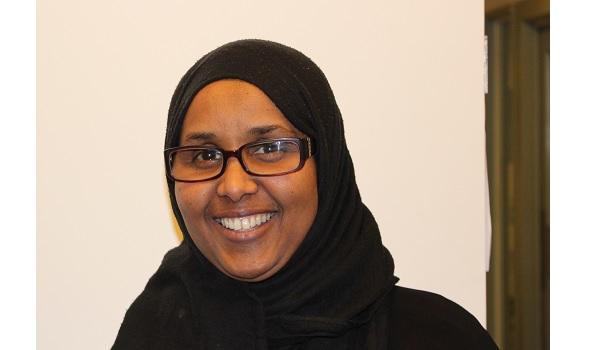Helping London’s youth: Jamad's story
Helping London’s youth: Jamad's story

Jamad Abdi is a very active and dynamic woman, passionate about helping young people and families to improve their lives.
She moved to London 25 years ago, when she was very young, escaping from the war in Somalia. Despite initial difficulties, she managed not only to rebuild her life in the UK but also to help many other people in the UK and in Somalia.
“I arrived alone, after a very long trip, with no English and no knowledge of this country,” says Jamad. “It was hard! I immediately enrolled in ESOL (English language) classes, and once I had learnt the language, I took several vocational courses including child care, teaching assistant and health advocacy.”
In 2002 Jamad started working in a charity, helping Somali people, and in 2008 she was hired by Islington Council as a bilingual family support worker. Last year, she became a family engagement worker, giving families with children information about child development and helping them access services.
In her role at Islington Council Jamad helps any family (Britons as well as immigrants and refugees) living in the area. She also maintains a special commitment to helping Somali people. In 2014 she founded the Galbur Foundation, a charity operating in Islington and in Somalia.
The name of the charity comes from the union of two Somali words: gal, which means a small puddle of rainwater, and bur, which means mountain.
“The first word evokes something precious, because rain is quite rare in Somalia”, explains Jamad. “The second word evokes something concrete. The two words together transmit a sense of hope, something concrete and precious like the help we offer to young people and families.”
The Galbur Foundation fights poverty and lack of education in Somalia and helps youths from disadvantage groups in Islington to reach their potential through art, education, sport and culture.
In Somalia the charity runs a school for disabled children, providing them with lunch, not only because they need the food but also as a strategy to convince families to send children to school, as food and not education is often their first priority. In Islington the charity carries out many different activities, inspired by ideas from the young people themselves and the help they provide as volunteers at the Galbur Foundation.
Many of the activities of the Galbur Foundation in Islington are focused on mental health and crime, two problems that are closely related. According to Jamad, in Islington, mental health disorders are most prevalent in black children and young people, 15 per cent of whom suffer from mental health problems. She adds that the area has the highest prevalence of mental health issues in London.
Working at Islington Council, Jamad realised that while there are a lot of services offered to young people, ethnic minorities are less likely to access them. She works to bridge this gap, as well as the cultural gap dividing migrant parents and their children. While youths like joining the art industry, for example, their parents often don’t consider an education in the arts to be valuable.
One of the first initiatives of Galbur Foundation was “Promoting Mental Health Through Art”, a four- week programme with workshops led by the artist Anab Eided, attended by 20 participants aged 10 to 16.
“Every session we discussed different topics, such as emotions, identity and safety,” explains Jamad. “In the last session we involved families and invited the police to speak about how to be safe in the neighbourhood. We had very positive feedback.”
In partnership with the Council, the Galbur Foundation is organising a youth conference on mental health in February 2019.
“Ethnic minorities find it difficult talking about this topic, for cultural and religion reasons,” says Jamad. “They don’t know how the available services work and where they are, while service providers have a lack of understanding of the culture these groups come from. We’ll help them to learn from each other.”
Sport is also a field of action of this charity, again with projects that aim to bridge the gap between migrant parents and their children.
After a football fun day last April, the foundation is now organising a girls’ football club with a professional coach.
“Our target is 25 girls, but I believe we’ll have a waiting list!” Jamad said.
Jamad’s six children help her to organise all these initiatives and she loves helping everyone. At Christmas she spent 12 hours serving food to homeless people in a church.
“It’s all about humanity,” she says. “Immigrants and refugees don’t come to this country just to look for support. They want to work, live their lives and help others. I believe the UK would not be one of the greatest countries in the world without their contribution.”


